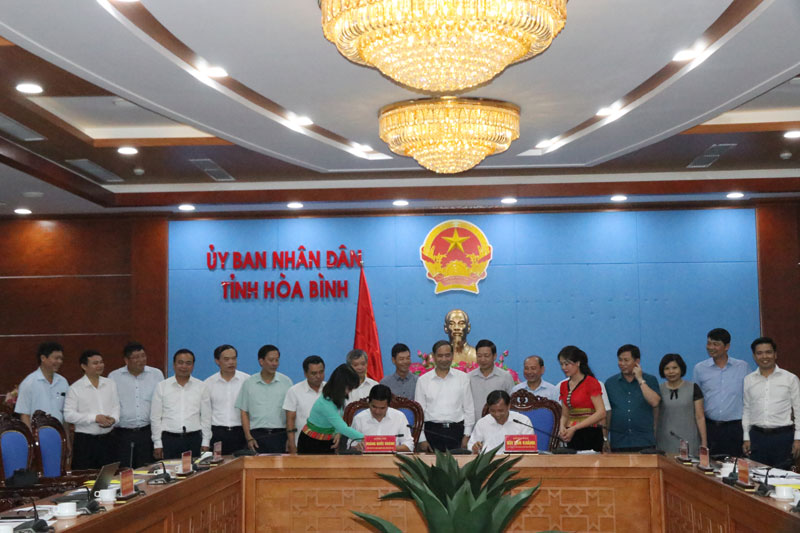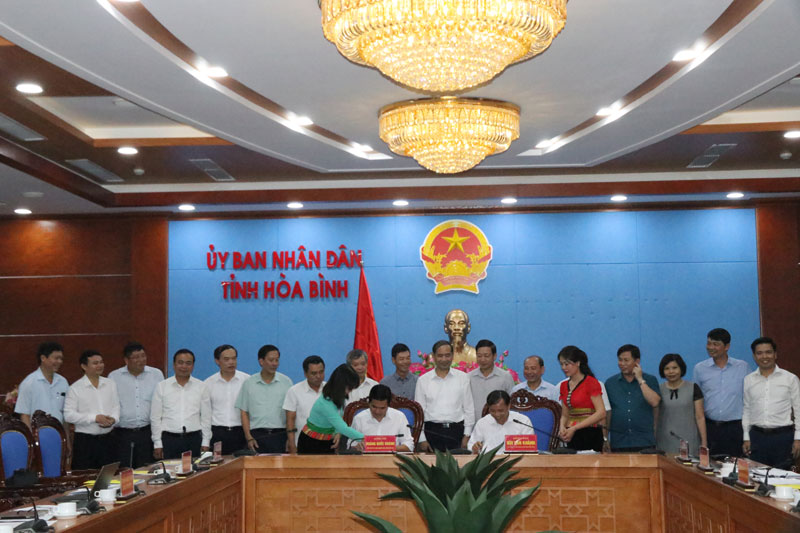
(HBO) - Leaders of the Hoa Binh provincial People's Committee held a working session with a working delegation from the Son La provincial People's Committee on September 24 to discuss the implementation of the project on the construction of Hoa Binh - Moc Chau expressway.
The Hoa Binh - Moc Chau expressway construction project in
the public-private partnership (PPP) model was approved by the Prime Minister
under Decision No.579/QD-TTg dated May 17, 2019. The expressway has a total
length of 85km, including 49km in Hoa Binh and 36m in Van Ho and Moc Chau
districts, Son La province. The Group A project has a total investment of over
22.2 trillion VND, about 5 trillion VND of which is from the local State
budget, including around 9 trillion VND from Hoa Binh and the remaining from Son La. The
investor conducted a detailed study on specific geological conditions to devise
proper plan for the work.
 Chairmen of the provincial People’s Committees of Hoa
Binh and Son La sign minutes of meeting on Hoa Binh – Moc Chau expressway.
Chairmen of the provincial People’s Committees of Hoa
Binh and Son La sign minutes of meeting on Hoa Binh – Moc Chau expressway.
As directed by the Prime Minister, the construction will
begin no later than late 2020. The two provinces are preparing for work and
discussing contents to launch the project.
After discussions, the two provinces’ leaders signed minutes
of meeting on the implementation of the PPP project, with basic contents such
as accelerating the progress of the important project and assigning the
investor to conduct a feasibility report under an agreement signed by the Son
La provincial People’s Committee and the investor on July 29, 2019. They agreed
to establish a steering committee for the project and the plan on the
implementation of the Prime Minister’s Decision No.579/QD-TTg dated May 17,
2019 in line with legal regulations and as scheduled, and asked the Son La
provincial Department of Planning and Investment to collect public feedback on
the effort./.
According to data from the Hoa Binh Provincial Party Committee, the industrial production index for the first six months of 2025 is estimated to have increased by 20% compared to the same period last year. This marks the highest year-on-year growth rate for this period since 2020.
In the first six months of 2025, Hoa Binh province’s export turnover was estimated at 1.145 billion USD, marking an 18.11% increase compared to the same period in 2024. Import turnover was estimated at $ 804 million, a 17.15% increase, which helped the province maintain a positive trade balance.
The lives of the ethnic minority farmers in Tan Lac district have gradually improved thanks to the new directions in agricultural production. This is a testament to the collective strength fostered through the professional associations and groups implemented by various levels of the district’s Farmers’ Union.
With the motto the "product quality comes first,” after nearly one year of establishment and operation, Muong village’s Clean Food Agricultural and Commercial Cooperative, located in Cau Hamlet, Hung Son Commune (Kim Boi district), has launched reputable, high-quality agricultural products to the market that are well-received by consumers. The products such as Muong village’s pork sausage, salt-cured chicken, and salt-cured pork hocks have gradually carved out a place in the market and they are on the path to obtaining the OCOP certification.
In the past, the phrase "bumper harvest, rock-bottom prices" was a familiar refrain for Vietnamese farmers engaged in fragmented, small-scale agriculture. But today, a new spirit is emerging across rural areas of Hoa Binh province - one of collaboration, organisation, and collective economic models that provide a stable foundation for production.
Maintaining growing area codes and packing facility codes in accordance with regulations is a mandatory requirement for agricultural products to be eligible for export. Recently, the Department of Agriculture and Environment of Hoa Binh province has intensified technical supervision of designated farming areas and packing facilities to safeguard the "green passport" that enables its products to access international markets.



 Chairmen of the provincial People’s Committees of Hoa
Binh and Son La sign minutes of meeting on Hoa Binh – Moc Chau expressway.
Chairmen of the provincial People’s Committees of Hoa
Binh and Son La sign minutes of meeting on Hoa Binh – Moc Chau expressway.